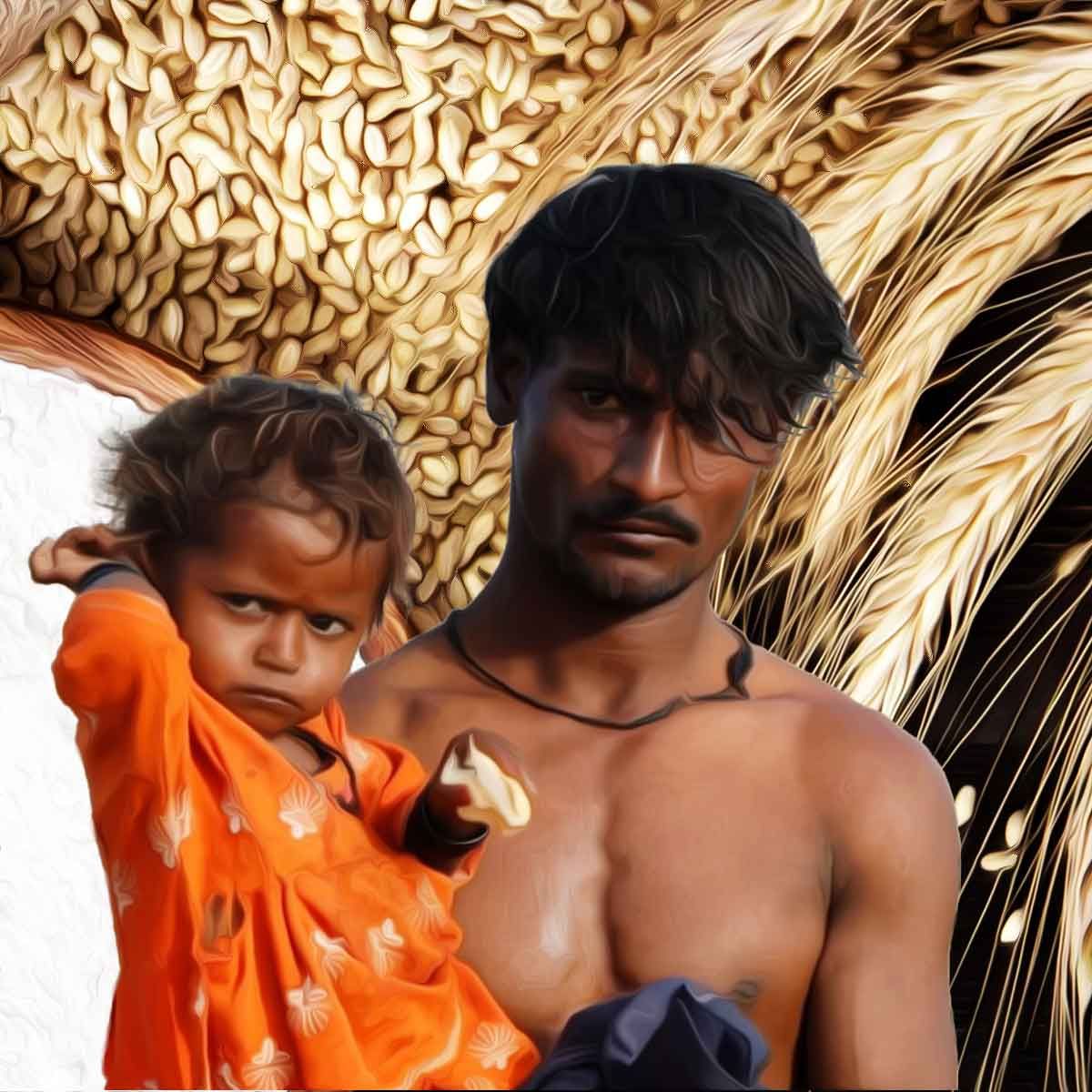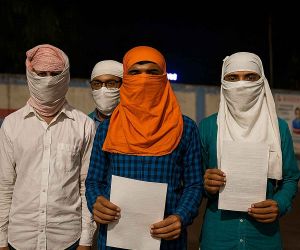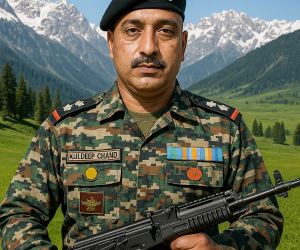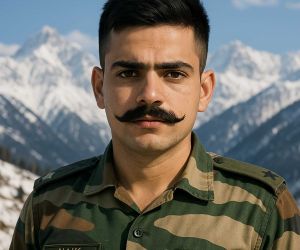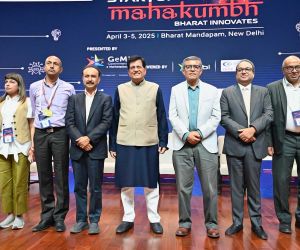MORE COVERAGE
Twitter Coverage
Satyaagrah
Written on
Satyaagrah
Written on
Satyaagrah
Written on
Satyaagrah
Written on
Satyaagrah
Written on
JOIN SATYAAGRAH SOCIAL MEDIA
There's a whisper in World Bank now-a-days that it is changing into World Bank of India; check this out - President Ajay Banga, CFO Anshula Kant, Chief Economist Indermit Gill, Chief Risk Officer Lakshmi Shyam-Sunder, VP-Human Development Mamta Murthi

Ajay Banga, the Indian-origin chief of the World Bank, is an embodiment of success and inspiration for Indians worldwide. Born in Jalandhar, Punjab, and the son of ex-Indian Army Lieutenant General Harbhajan Banga, his journey from humble beginnings to the presidency of the World Bank is truly remarkable.
|
Ajay Banga's educational background played a crucial role in shaping his career. He attended the prestigious Hyderabad Public School, followed by St. Stephen's College, and later pursued his management education at the renowned Indian Institute of Management, Ahmedabad.
Before assuming his role at the World Bank, Banga held several prominent positions in the corporate world. He had an illustrious tenure at Citigroup and Nestle, accumulating valuable experience over more than a decade. However, it was his association with Mastercard that truly propelled him to the forefront. Banga's exceptional leadership skills and business acumen earned him a substantial salary of Rs 192 crore during his time at Mastercard. Additionally, he served as the vice chairman of General Atlantic, further solidifying his reputation as a respected figure in the business community. With a net worth of Rs 1700 crore in 2021, Banga's financial success reflects his exceptional achievements
|
Beyond his professional accomplishments, Ajay Banga has made significant contributions to various sectors. In recognition of his contributions to trade and industry, he was honored with the Padma Shri in 2016, one of India's highest civilian awards. Under his leadership at Mastercard, the Center for Inclusive Growth was established. This organization focuses on promoting equitable and sustainable economic growth, as well as financial inclusion on a global scale. Banga's commitment to fostering international trade relations was further demonstrated during his tenure as the Honorary Chairman of the International Chamber of Commerce from 2020 to 2022.
As the President of the World Bank, Ajay Banga's impact on the global stage continues to grow. With a five-year term ahead of him, he brings his extensive experience and unique perspective to this vital international institution. His leadership is expected to influence global economic policies and contribute to poverty reduction and the promotion of shared prosperity.
Adding to his list of achievements, Ajay Banga was recently recognized on the 2023 list of Great Immigrants, published by the Carnegie Corporation of New York. This prestigious annual list celebrates naturalized Americans who have made significant contributions to their adopted country. The inclusion of 35 individuals from 33 different countries highlights the global recognition of exceptional immigrants and their outstanding achievements.
Ajay Banga's journey and accomplishments serve as a source of pride and inspiration for India. His success demonstrates the potential for Indians to reach the highest levels of international institutions. His story is a shining example of the importance of hard work, dedication, and perseverance, especially for young Indians aspiring to make a difference in the world. Ajay Banga's exceptional career trajectory showcases the remarkable achievements that can be realized with determination and a relentless pursuit of excellence.
|
The Opportune Timing of Ajay Banga's Appointment
Ajay Banga's appointment as the President of the World Bank comes at a crucial time, carrying significant implications for India and the Global South. His leadership assumes particular importance as the world grapples with the worsening poverty levels caused by the Covid pandemic and the war in Ukraine. In addition, the urgent concerns surrounding climate change and its impact on developing economies have become major focal points for policymakers worldwide.
The timing of Banga's appointment is not merely coincidental; it coincides with persistent calls for reform within aid institutions to ensure a more diverse representation of voices and perspectives. This is why his rise to this prominent position carries substantial significance not only for India but also for the Global South as a whole. By nominating Banga, the White House acknowledged his global leadership in technology, data, financial services, and innovation for inclusion.
President Biden himself emphasized Banga's critical experience in mobilizing public-private resources to address pressing challenges, including climate change. Having been raised in India, Banga possesses a unique perspective on the opportunities and challenges faced by developing countries. His appointment reflects the World Bank's commitment to delivering on its ambitious agenda of reducing poverty and fostering prosperity worldwide.
Banga's ascent to this prestigious role follows a trend of individuals of Indian origin assuming key positions within the World Bank. Anshula Kant, a former Managing Director of the State Bank of India and a product of Delhi School of Economics, currently serves as the Managing Director and Chief Financial Officer of the World Bank Group. Similarly, Indermit Gill, an Indian national and renowned economist who has taught at prestigious universities such as the University of Chicago and Georgetown University, holds the position of the World Bank's Chief Economist. Lakshmi Shyam-Sunder, an MBA graduate from IIM Ahmedabad, has served as the Chief Risk Officer of the World Bank Group since February 2014. Furthermore, Parameswaran Iyer, an Indian Administrative Service (IAS) officer representing Bangladesh, Bhutan, India, and Sri Lanka, serves as an Executive Director at the World Bank Group.
The confluence of Ajay Banga's appointment, the prevailing global challenges, and the growing representation of individuals of Indian origin within the World Bank reflects a positive development. It showcases India's rising prominence and influence on the global stage, while also underscoring the country's commitment to addressing pressing issues such as poverty reduction, climate change, and sustainable development.
|
CFO Anshula Kant
Anshula Kant is an Indian banker who has been serving as the Managing Director and World Bank Group Chief Financial Officer since October 2019. Prior to this, she had a long career at the State Bank of India where she was CFO. The CFO is responsible for the financial and risk management of the World Bank Group. This includes financial reporting and risk review processes, and working closely with member countries to deliver innovative financial products and services. The CFO also oversees the financial sustainability of the institution and ensures the effective management of the World Bank's $200+ billion balance sheet.
Anshula Kant, born on September 7, 1960, in Roorkee, India, is the Chief Financial Officer and Managing Director of the World Bank Group, a position she was appointed to on July 12, 2019. She is the first woman to hold this position in the World Bank's history.
Kant completed her master's degree in Economics from the Delhi School of Economics and her bachelor's degree in Economics from Lady Sri Ram College for Women, both of Delhi University. She is also a Certified Associate of the Indian Institute of Bankers.
Her career began in 1983 when she joined the State Bank of India (SBI) as a probationary officer. She held several key positions in SBI, including Chief General Manager of SBI (Maharashtra and Goa), Deputy Managing Director of Operations for National Banking Group, and Chief Executive Officer of SBI (Singapore). In September 2018, she became the Managing Director of SBI for a period of two years, and a member of the bank's board.
As the CFO and Managing Director of the World Bank Group, Kant is responsible for the balance sheet and financial and risk management of the institution. In January 2023, it was announced that Kant would lead the Evolution Roadmap exercise, aimed at exploring how the World Bank Group can better respond to the need for increased action to address the growing crisis of poverty and economic distress, and global challenges, including climate change, pandemic risks, and rising fragility and conflict.
Anshula Kant's appointment to the World Bank is a significant milestone for India as it marks the first time an Indian woman has held such a high-ranking position in the institution. Her extensive experience in banking and financial management, coupled with her understanding of the Indian economy, brings a unique perspective to the World Bank. This could potentially lead to a greater understanding and consideration of India's economic and development challenges within the World Bank's decision-making processes.
|
Chief Economist Indermit Gill
Indermit Gill is an economist who has been serving as the Vice President for Equitable Growth, Finance, and Institutions in the World Bank since 2020 also their Senior Vice President for Development Economics. He has previously served as the Director for Development Policy in the Office of the Chief Economist at the World Bank. The Chief Economist is the main advisor to the President of the World Bank on economic matters. They lead the Bank's efforts to develop innovative solutions and improve the quality of economic research and policy advice provided to client countries. They also oversee the Bank's research program and the preparation of major reports on economic development issues.
His work focuses on economic growth, poverty, institutions, conflict, and climate change.
Gill completed his B.A. Hons in economics from St. Stephen's College, New Delhi, in 1981, and an M.A. in economics from Delhi School of Economics in 1983. He was awarded his Ph.D. by the University of Chicago.
Before his current role at the World Bank, Gill has had a distinguished career in academia and research. He has worked at Duke University, the Brookings Institution, Georgetown University, and the University of Chicago.
Some of his notable publications include "The middle-income trap turns ten" and "An East Asian renaissance: Ideas for economic growth," both of which were published by the World Bank.
As the Chief Economist of the World Bank, Gill is responsible for providing intellectual leadership and direction to the Bank’s overall development strategy and economic research agenda, at global, regional and country levels. He also advises the President and the Bank’s management on economic issues.
|
Chief Risk Officer Lakshmi Shyam-Sunder
Lakshmi Shyam-Sunder is the Vice President and Chief Risk Officer for the World Bank Group, a position she has held since February 2014. Prior to this, she served as the Chief Financial Officer and Director, Finance and Risk at the Multilateral Investment Guarantee Agency (MIGA), the political risk insurance and credit enhancement arm of the World Bank Group.
Shyam-Sunder has had a significant impact on the World Bank Group's risk management practices. She was one of the key contributors to the MIGA/IBRD Exposure Exchange Agreement within the Bank Group and was responsible for strengthening and enhancing the finance, risk, resource management, IT, and control functions in MIGA.
Before joining MIGA, Shyam-Sunder worked at the International Finance Corporation (IFC), where she held a variety of positions. As Director for Corporate Risk, she led the development of a new Client Risk Management Advisory Service function for IFC clients and the creation of the International Financial Institutions Risk Data Consortium. She also developed IFC’s integrated economic capital and pricing framework, and had responsibility for all financial risks arising from the Corporation’s loan and equity investments in emerging markets, and Treasury activities as well as managing rating-agency issues.
Shyam-Sunder has also served on the Board, and Finance and Risk Committees of institutions in emerging markets. Before joining IFC, she was a faculty member at the MIT Sloan School of Management, where she received an award for Excellence in Teaching. She was also on the faculty of The Tuck School of Business Administration at Dartmouth College.
She holds a Ph.D. in finance from the MIT Sloan School of Management and an MBA from the Indian Institute of Management, Ahmedabad. Shyam-Sunder was born in Iraq, and grew up in India.
As the Chief Risk Officer of the World Bank, Shyam-Sunder plays a crucial role in managing the financial and operational risks of the institution. Her leadership and expertise in risk management contribute to the financial stability and effectiveness of the World Bank in achieving its mission of reducing poverty and supporting sustainable development.
|
Executive Director NITI Aayog CEO Parameswaran lyer
Parameswaran Iyer, born on April 16, 1959, in Srinagar, India, is an Indian civil servant and the former CEO of NITI Aayog. He is currently serving as India's nominee as an Executive Director in the World Bank.
Iyer was educated at The Doon School in Dehradun, and at the St. Stephen's College, Delhi. As a student of St. Stephen’s College, he represented India at the Junior Davis Cup in Tennis. He then got a one-year exchange scholarship at Davidson College in North Carolina.
He joined the Indian Civil Services in 1981. In 2009, he took a voluntary retirement to become the water resources manager at the World Bank. At the World Bank, he worked in several countries, including China, Vietnam, Egypt, Lebanon, and Washington, D.C.
In 2016, he joined the Ministry of Drinking Water and Sanitation, Government of India, and was appointed by Prime Minister Modi to spearhead the Swachh Bharat Mission and Sanitation and water Management campaigns related to it. He also served as a Professor of Management Practices at the Indian Institute of Management (IIM), Ahmedabad.
In 2022, he returned to Indian Administration as the head of the Government of India's apex think tank, NITI Aayog. In 2023, he was nominated as an Executive Director of the World Bank by India.
Iyer's work, particularly his leadership of the Swachh Bharat Mission, has had a significant impact on sanitation and water management in India. His current role as an Executive Director at the World Bank allows him to bring his extensive experience and understanding of development issues to the global stage. This could potentially lead to a greater understanding and consideration of India's economic and development challenges within the World Bank's decision-making processes.
|
Vice President for Human Development - Mamta Murthi
Mamta Murthi is the Vice President for Human Development at the World Bank, a position she assumed on July 1, 2020. In this role, she oversees the Global Practices for Education, Health, Nutrition, and Population, Gender, Social Protection and Jobs, as well as the Human Capital Project.
Murthi has held many leadership positions at the World Bank, including as Director of Operations Policy (2019), Director of Strategy and Operations in Infrastructure (2018), Director of Strategy and Operations in the Africa Region (2015-2018), and Regional Country Director for the EU, based in Brussels (2012-15).
An economist by training, she has had technical roles in Social Protection and Labor (1996-2004) and Education (2006-10). She was Deputy Director of the World Development Report on Development and the Next Generation in 2006. During 1998-2000, Mamta was MacArthur Fellow for Poverty and Inequality at King’s College, Cambridge.
Murthi joined the World Bank as a Young Professional in 1995. She has a Bachelors’ Degree in Economics from St. Stephen’s College, University of Delhi, and a D.Phil in Economics from the University of Oxford. Mamta has written extensively on poverty, demography, education, pensions, and skills and is well-known for her econometric studies on fertility in India.
As the Vice President for Human Development, Murthi plays a crucial role in shaping the World Bank's policies and programs related to education, health, gender, social protection, and jobs. Her work contributes to the World Bank's mission of reducing poverty and supporting sustainable development. Her extensive experience and understanding of development issues bring a unique perspective to the World Bank's work in these areas.
|
These positions are crucial for the functioning of the World Bank. They ensure that the institution is financially sound, that its operations are risk-adjusted, and that it is delivering on its mission to reduce poverty and support sustainable development. The individuals in these roles can have a significant impact on the direction of the Bank's work and its engagement with member countries.
The presence of these Indian professionals in high-ranking positions within the World Bank is a testament to the recognition of Indian talent on the global stage. It could potentially lead to a greater understanding and consideration of India's economic and development challenges within the World Bank's decision-making processes.
 Support Us
Support Us
Satyagraha was born from the heart of our land, with an undying aim to unveil the true essence of Bharat. It seeks to illuminate the hidden tales of our valiant freedom fighters and the rich chronicles that haven't yet sung their complete melody in the mainstream.
While platforms like NDTV and 'The Wire' effortlessly garner funds under the banner of safeguarding democracy, we at Satyagraha walk a different path. Our strength and resonance come from you. In this journey to weave a stronger Bharat, every little contribution amplifies our voice. Let's come together, contribute as you can, and champion the true spirit of our nation.
 |  |  |
| ICICI Bank of Satyaagrah | Razorpay Bank of Satyaagrah | PayPal Bank of Satyaagrah - For International Payments |
If all above doesn't work, then try the LINK below:
Please share the article on other platforms
DISCLAIMER: The author is solely responsible for the views expressed in this article. The author carries the responsibility for citing and/or licensing of images utilized within the text. The website also frequently uses non-commercial images for representational purposes only in line with the article. We are not responsible for the authenticity of such images. If some images have a copyright issue, we request the person/entity to contact us at This email address is being protected from spambots. You need JavaScript enabled to view it. and we will take the necessary actions to resolve the issue.
Related Articles
- ‘Debt trap’ policy of China to undermine sovereignty of nation-States has begun to backfire
- With Lord Mountbatten & Edwina's 'bed-hopping' marriage - gay brothels and affair with PM, British historian Andrew Lownie reveals it all
- "300 meetings, 200 hours, 15 drafts and the indomitable spirit of 4 diplomats": Discover the untold behind-the-scenes efforts at the monumental G20 Summit in forging a consensus on the Ukraine issue, marking a significant milestone in global diplomacy
- Farmers Truck protest is a new swag worldwide now: Canadian PM Justin Trudeau goes in hiding with family in a secret ‘undisclosed’ location after thousands of truckers carried out protests over vaccine mandates
- Dastardly case of mass shooting: 15-year-old boy dead, 4 injured including a police officer in Washington State of USA during the Moechella event, a music festival to commemorate the emancipation of enslaved African Americans
- "The future belongs to those who believe in the beauty of their dreams": IndiGo made history with a monumental aircraft order worth $50billion marking the largest order ever in the aviation industry highlighting unprecedented growth of air travel industry
- At least 22 people were reportedly found dead on Sunday inside a nightclub in a neighbourhood of East London, a city in southern South Africa, bodies were lying inside the venue as if they had collapsed on the floor
- "Cash prize worth lakhs to peddle misinformation against India": Islamist group Jamat-e-Islami linked Indian American Muslim Council gives cash to ‘journalists’ from Wire, Newslaundry, Scroll Caravan etc, with a long history of lobbying against India
- "Unity in strategy, strength in partnership": Amid China's rising influence in the Indo-Pacific, Germany strengthens military relations with 'reliable' India, eyeing secure trade routes and strategic collaborations while stepping up military ties
- 'Whats Wrong With India': A trend intended to malign India globally, backfires as Indians, showcasing unity, resilience & humor through a viral Israeli embassy video and national achievements, flipped the narrative, highlighting India's indomitable spirit
- "A star does not compete with other stars around it. It just shines": Harvard Law Review has elected Apsara Iyer as its 137th president, making her the first Indian American woman to head the prestigious publication in its 136-year history
- Just when several influential elements associated with the US Govt were dogmatizing India, American Islamist body CAIR releases a report claiming discrimination against Muslims increased by 9% in the USA
- League of Islamic Council denounces new ‘haram’ laws in Thailand that are in the Parliament, labelling them in violation of Islamic law and unworkable for practising Muslim, these are Cannabis Bill, Progressive Liquor Bill, and Same-Sex marriage Bill
- "तख़्तापलट": Meet Muhammad Yunus, interim chief of Bangladesh, branded a ‘bloodsucker’ by Sheikh Hasina and a ‘US asset,’ as the US revokes Sheikh Hasina’s visa after her ouster and the UK denies her asylum, leaving her stranded at Hindon Airbase in India
- "An Auction Win is Not a Sin - 1-2-3 Sold!": Family who won suitcases at Storage Unit Auction in New Zealand discovers dead bodies of children stuffed in it, police launched an investigation, believe the bodies may have been there for 2-4 years




















